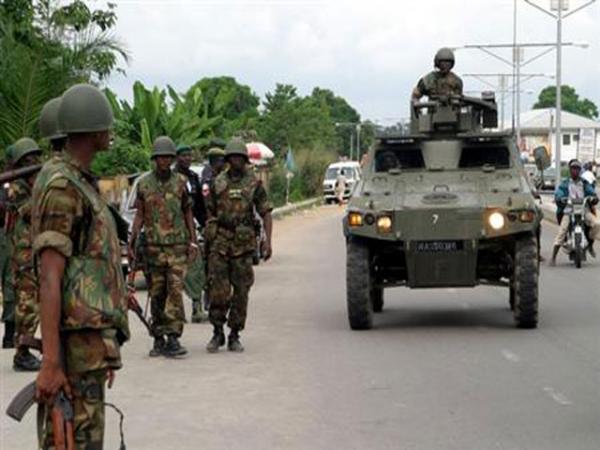
The Nigerian military is gearing up to disrupt planned nationwide protests slated for August 1 to 10 and has already sent a signal to deploy special squadrons to seize demonstration grounds.
Ahead of a widely publicised protest set to begin August 1, the Nigerian Air Force distributed a signal ordering airmen to be on “woodland camouflage,” a uniform mostly associated with combat, purportedly to stymie a breakdown of law and order on the protest days, Peoples Gazette reports, citing documents and officials familiar with the strategy.
The organisation-wide signal, which originated from “ATC/1617” on July 18, further asked officers from Ikeja Air Force Base and elsewhere to be acquainted and trained on “crowd dispersal scenarios” in line with extant military engagement rules.
Officers were asked to start wearing the camouflage from July 22 in the memo signed by Ibeabuchi VA and filed as LC/544/HQ. A moratorium was also imposed on administrative leaves and regular passes for service members until after the protests, the circular said, underscoring the Tinubu administration’s fears about the potential consequences of the protests on its reputation.
Officials said political heavyweights opposing the protest as a show of solidarity with the president have already hired thugs that would mingle with peaceful protesters to unleash mayhem.
The ensuing chaos would then present the Nigerian military and other security agencies with an excuse to disperse protesters using aggressive force, the sources said.
“They will hide under that influence and say the protests have been hijacked by thugs, so they have no other option than to open fire,” an official familiar with the detailed military plan said. Sources were granted anonymity to speak candidly without fear of retribution.
A Nigerian Air Force spokesman promised to review The Gazette’s inquiries about the plot but did not return comments in time for publication Sunday afternoon. The Nigerian Army declined comments.
Nigeria is facing its worst economic crisis in decades, with skyrocketing inflation, a national currency in free-fall and millions of people struggling to buy food. Only two years ago Africa’s biggest economy, Nigeria is projected to drop to fourth place this year.
The pain is widespread. Unions strike to protest salaries of around $20 a month. People die in stampedes, desperate for free sacks of rice. Hospitals are overrun with women wracked by spasms from calcium deficiencies.
Although Mr Tinubu increased the minimum wage — after strike action and monthslong negotiations with labour unions — from N30,000 to N70,000, his government has increased spending for officials at a time of nationwide starvation.
For workers earning the new N70,000, or $43, per month minimum wage, capricious inflation and naira value have inflicted too much damage for the changes to make any difference in their lives.
The crisis is largely believed to be rooted in two major changes implemented by President Bola Tinubu, elected 14 months ago: the partial removal of fuel subsidies and the floating of the currency, which together have caused major price rises.
A nation of entrepreneurs, Nigeria’s more than 200 million citizens are skilled at managing in tough circumstances, without the services states usually provide. They generate their own electricity and source their own water. They take up arms and defend their communities when the armed forces cannot. They negotiate with armed kidnappers when family members are abducted.
But right now, their resourcefulness is being stretched to the limit.
Some folks are planning protests to voice their concerns about the economic situation, including rising inflation and poverty, under President Tinubu’s administration.
The protests are expected to happen in the north and other parts of the country, but residents and leaders of the south-eastern region, inhabited by the Igbo ethnic group – have made it clear that they are not going to be part of the mass action.
The planned protests have already ignited debates on social media between Mr Tinubu’s supporters — who had previously advocated for similar protests under former president Goodluck Jonathan in 2012 — and next month’s would-be demonstrators.
Mr Tinubu’s government warned that a breakdown of law would not be tolerated, while Nigerians were furious that the same individuals who, in 2012, organised demonstrations against Mr Jonathan’s government for terminating fuel subsidies are now aggressively opposing the same cause under a different leader.
KOIKI Media bringing the world 🌎 closer to your door step
